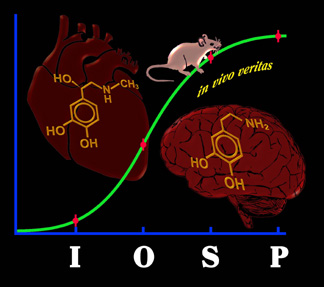 A UNMC-led consortium has landed one of four National Institutes of Health grants to present a short course in Integrative and Organ Systems Pharmacology (IOSP). These short courses are designed to train researchers in the use of intact animals and relatively intact isolated organs or tissues.
A UNMC-led consortium has landed one of four National Institutes of Health grants to present a short course in Integrative and Organ Systems Pharmacology (IOSP). These short courses are designed to train researchers in the use of intact animals and relatively intact isolated organs or tissues.
David B. Bylund, Ph.D., professor and former chairman of the UNMC Department of Pharmacology, is the principal investigator on the three-year grant from the National Institutes of General Medical Sciences (NIGMS). The UNMC-led consortium includes Creighton University Medical Center, the University of Kansas Medical Center and Abbott Laboratories.
“It’s important for scientists to have an understanding of how the organ systems work together in an intact animal and more specifically how the effects of drugs on isolated cells may be much different than on cellular or subcellular assay systems,” Dr. Bylund said.
In addition to the UNMC-led consortium, the NIH-sponsored courses were awarded to: the departments of pharmacology at the University of North Carolina-Chapel Hill, the University of California-San Diego and Michigan State University. The grant provides approximately $179,000 in each of its three years.
Twenty-four graduate students (Ph.D. level), postdoctoral fellows and scientists from academic and industry will take the June 6-17 summer training course – which emphasizes cardiovascular and neuropharmacology – at UNMC and Creighton University. The course includes lectures, demonstrations and an abundance of hands-on laboratory exercises.
The short courses will provide training in what is now called “integrative pharmacology,” aimed at training researchers in the use of intact animals and relatively intact isolated organs or tissues. The course will help “integrate” understandings of cellular and molecular pharmacology into the context of the whole organism, which is part of a wider movement toward more “translational” approaches to research at the NIH.
The impetus for the short courses initially came from pharmaceutical industry leaders who were concerned about the general lack of a strong pool of pharmacologists trained in the more “classical” organ system and whole animal approaches. Together with the American Society for Pharmacology and Experimental Therapeutics (ASPET), industry leaders generated funding from NIGMS for a limited number of short courses to address the deficiency.
Department graduate students, fellows and faculty members who are interested in the program are encouraged to consider participating in the course. More information, including details on the course, the faculty involved, and application materials, is available at the IOSP Web site at http://unmc.edu/iosp. Applications will be accepted until the course fills.